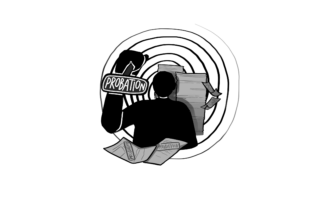In a poll on The Aragon Outlook Instagram, 87% of respondents said that they considered trash a problem at Aragon. Litter is more than an aesthetic issue – the messes students make create a heavier burden for facilities staff. The editors of the Aragon Outlook believe that Aragon should implement a “beautification”-style detention for littering, meaning task students with picking up trash as a disciplinary measure.
Aragon detention is currently designed to be restorative instead of punitive – attendees spend an hour after school completing a reflection sheet, writing about how their actions impact others, their academic success and their futures. Staff members, like assistant principals David Moore and Andrew Hartig, often follow up with students about their answers in one-on-one meetings.
“The deeper level is teaching all of us to be responsible and accountable,” Moore said. “That’s a lifelong skill.”
Aragon focuses on retributivism, that punishment should fit the crime. Each type of infraction has a different reflection sheet, from behavioral issues to tardies. Beautification follows this framework – picking up trash correlates to littering.
The Outlook advocates for splitting detention time between picking up trash and reflection. Students often finish the reflection sheet early, meaning they would have time to pick up trash without having to stay longer after school, and additional supervision wouldn’t be required.
Because so many administrators walk around campus during brunch and lunch, when students are most likely to litter, there is already the supervision necessary to catch people littering.
Currently, there is no direct punishment for littering. So far, Aragon administration and leadership has focused on prevention and education, like through CARES presentations.
“When we did the presentations last year, it helped in the beginning – we saw a significant difference,” said leadership student Brooke Barson. “Then [this year], it reset. We were back to normal.”
Local middle schools have successfully assigned lunchtime trash pickup to students for tardies, distractions and other infractions. Establishing an explicit consequence can disincentive people from littering.
“The trash attracts the seagulls [and] rats, so for health reasons, we want to make sure that we’re taking care of the planet properly,” said Assistant Principal Andrew Hartig.
Barson expanded on what she thinks causes the trash problem.
“Students [have to] recognize that the staff is human and that they’re picking up our mess,” Barson said. “The greatest challenge is having the message resonate with the students — that this is like a problem now and that we need to fix it now.”
Needless trash also impacts the facilities staff.
“We spend a lot of time picking up garbage that we could spend on improving the campus [instead],” said facilities manager Gaby Gonzalez. “We have to dedicate our time to picking up garbage in the swimming pool because kids will throw things down [there].”
Moreover, litter damages people’s perceptions of Aragon.
“I don’t know [if] the students realize that when you have parents or outside people who are visiting the campus and they see all of the garbage, [that’s] the message [we] send to people,” Gonzalez said. “How we present ourselves is reflected in that.”
Littering has become a pervasive issue on campus in the past couple years. Small actionable steps like implementing beautification detentions will help alleviate the trash problem at Aragon and encourage respect for facilities staff, accountability for students’ actions and improve the student experience on campus.



